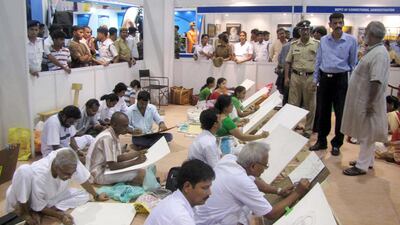The Government College of Art & Craft (GCAC) in Kolkata has plenty of visitors. But the 14 burly men who, in October, spent several hours in the classrooms and studios of India’s oldest art institution were a breed apart – they were convicts from the city’s Alipore and Presidency prisons. And they were shadowed by prison guards.
The inmates marched in escorted by their jailhouse art teacher, Chitta Dey, a full-time painter, and brought with them palettes, brushes and pencils.
“I was particularly enthralled to see the spot where Rabindranath Tagore [who won the Nobel Prize for Literature] used to paint [in the art college],” says Rashid Khan, who is serving a life sentence.
Khan and other lifers met the students and teachers, including the principal Rebanta Goswami, and took part in a figure drawing exercise with a woman model posing in the classroom, besides visiting the world-class carpentry, ceramic and printmaking workshops.
The inmates’ extraordinary trip to the institute, which has produced some of the country’s foremost painters, sculptors and designers, is the outcome of a novel experiment which started in 2007.
Six years ago, alarmed by rising cases of mental illness in Kolkata’s prisons, the prison directorate fell back on art therapy to curb suicidal tendencies triggered by confinement behind high walls.
Chitta Dey, a successful painter and GCAC alumnus, was hand-picked for the job. When news of the unprecedented initiative leaked out, an art foundation sent gifts of canvas, paper, colours and crayons.
Dey screened the inmates, identifying those who were interested in painting, drawing or sketching. Then he taught them the fundamentals of art and colour theory.
“The secret of art therapy lies in colours,” says Dey. “Dabbling with bright colours lifts the mood even in an unbearably depressing atmosphere. Painting is doing wonders – it’s proving to be a game-changer when all seems lost.”
As the project gathered steam, the jail administration provided space for an art school in Alipore jail where classes are held. The workshops by Dey’s artist friends also proved to be a big draw.
Within two years, the first exhibition and sale of the inmates’ creations was held at Calcutta’s prestigious Birla Academy of Art and Culture where buyers snapped up works priced between 8,000 and 10,000 rupees (up to Dh593). Subsequent exhibitions were equally successful. The next public display is planned for early next year.
I was granted permission to visit the prison art school, spread over two big rooms crammed with oil paintings, acrylic works and pencil and charcoal sketches. Some art works were stacked on the floor for want of wall space.
The prisoners’ unprecedented visit to GCAC is the brainchild of Dey and Rebanta Goswami. “As we are celebrating 150 years of the institution, it’s important that we throw open our doors to everyone, including those languishing behind bars but interested in the arts,” Goswami says, adding that he doesn’t mind convicts visiting GCAC regularly if the jail administration permits.
Ranvir Kumar, the inspector general of police (prisons), regards jails as correctional homes rather than punishment centres.
“My task is to balance the rights of victims with the convicts’ right to reintegrate with society. Culture therapy fulfils this objective besides combating mental illness. But each time I show the green light to anything for the first time – like the trip to GCAC – we fear that something might go wrong and we keep our fingers crossed.”
An art gallery owner, who requested anonymity, says that some collectors find art made by convicts simply irresistible. She recounted the auctioning of the British crime boss Ronnie Kray’s work in 2005 – an oil landscape on canvas that sold for £2,200 (Dh13,391), twice the expected price. Ronnie and his twin brother Reggie Kray ran a notorious gang in London’s East End called The Firm. Jailed together, Ronnie took up painting while in Broadmoor prison.
Nitai Hari Ghosh, who spent a day at GCAC, says he greatly enjoyed the whole experience and rues having to return to his prison cell. Ghosh is imprisoned for life for murdering his wife. “We have low self-esteem,” he says. “But when I see my painting, or see others admiring it, I feel I have achieved something.”
artslife@thenational.ae
Follow us @LifeNationalUAE
Follow us on Facebook for discussions, entertainment, reviews, wellness and news.

